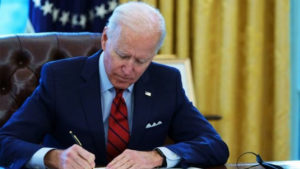 Hot spots have mushroomed across the world in 2021, adding multiple international crises to President Biden’s formidable domestic to-do list.
Hot spots have mushroomed across the world in 2021, adding multiple international crises to President Biden’s formidable domestic to-do list.
Why it matters: Cracks in the global order, which had been presided over by unrivaled American influence since the end of the Cold War, are growing. The proliferation of great-power flashpoints, and failing or failed states, creates new threats to American leadership — and to the global economy, which has been recovering.
Get market news worthy of your time with Axios Markets. Subscribe for free.
Here’s a tour of world instability. Biden has faced new versions of several familiar crises:
Russia massed troops on Ukraine’s borders this spring, and the skies over Gaza were lit in May with fire from Israel and Hamas. Both crises were paused, rather than ended.
Tensions between India and Pakistan over Kashmir are decades in the making. But there’s new cause for concern in the Himalayas after border skirmishes between India and China. All three are nuclear powers.
The power struggle in Venezuela continues, Yemen’s humanitarian crisis has deepened, and Syria and Libya remain hotbeds of unrest and foreign meddling.
Biden can expect escalation from the newest nuclear power, North Korea, at some point in his tenure. Iran is accelerating its nuclear program.
And Taiwan is the flashpoint of all flashpoints. A Chinese invasion of the self-governing island seems increasingly likely, though not imminent, and could lead to a scale of warfare the world hasn’t seen in decades.
Even short of that, flare-ups will continue over the South China Sea.
The world has also experienced a wave of protest and political instability, from the coup in Myanmar to the assassination of Haiti’s president.
Peru’s presidential transition has been held hostage by electoral fraud claims, Colombia’s security forces have cracked down on mass protests, and Cubans have come out into the streets on an unprecedented scale. Violence and instability in Central America continue to push migrants northward.
Lebanon’s political deadlock is fueling its economic collapse, with the West unsure whether to aid the country’s hapless leaders or sanction them.
Ethiopia is in the midst of a civil war. Even in comparatively stable South Africa, destructive riots swept through cities in recent days.
Afghanistan remains one of the world’s most unstable countries, as the American footprint is suddenly withdrawn.
A total Taliban takeover is a very real possibility.
Biden has a decision to make about the remaining U.S. troops in Iraq, which are now engaged in a proxy war with Iran-backed militias.
What we’re watching: Inflation creates its own political risks around the world.
If inflation proves more severe and persistent than forecast, central banks will be forced to raise rates — and risk stalling the current economic recovery and employment gains.
